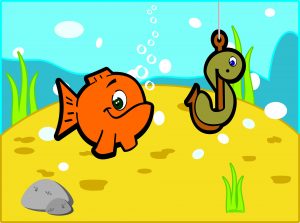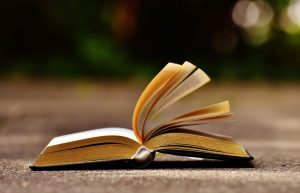blogger: Cynthia Ruchti
Hunkered down before it was mandated–due to a virus without a fancy, recognizable name–I’ve been watching a lot of free movies online. Some of them were poorly written, directed, or acted, but I kept watching. On purpose. Not just because it took a lot of energy to click on that little X in the upper righthand corner, but because knowing what makes a bad movie bad can also help inform what makes a good movie good.
The same principles often apply to what makes a good book worth reading or why a writer would push through to keep reading a bad book for educational purposes.
What’s the value of watching bad movies? What can we learn?
Hook ’em early
 Granted, in the past, when we didn’t have an almost infinite number of distraction and entertainment opportunities available to us, authors could afford to let their stories languidly wander into the interesting part. Writing instructors used to advise that an author capture the reader’s attention within the first three chapters. Today’s reader will not wait that long.
Granted, in the past, when we didn’t have an almost infinite number of distraction and entertainment opportunities available to us, authors could afford to let their stories languidly wander into the interesting part. Writing instructors used to advise that an author capture the reader’s attention within the first three chapters. Today’s reader will not wait that long.
We risk the reader setting the book aside as not worth their time if the author doesn’t hook the reader in the first scene or on the first page. Even better? With the first sentence.
Does the book have to start with an explosion or a meteor hurtling toward planet earth? A judge’s gavel? Prairie fire? The final beep of the heart monitor?
No. It can even begin with setting if the setting is evocative, a portend of things to come, with a word picture or other image that hints at the conflict or relationship tension or emotional draw of the story.
“Sorry I’m late. What did I miss?” He kissed her on the cheek, as usual. A nano-second of affection.
Ella surveyed the leftover cake, drooping balloons, and abandoned party hats. Without turning to her husband, she said, “Your last chance to be a hero for your son.”
So that’s what an eviction notice looks like. Tanya assumed it would be fluorescent orange or otherwise gaudy and harsh. She hadn’t expected a plain white piece of paper with the city’s letterhead and blank spaces filled in for her mandatory departure date. A form letter. As impersonal as had been her termination notice. But what did a whistleblower expect? Flowers and a parade?
Can you see the hints of what’s to come in both of the above examples?
Imagine a reader with somewhere in the neighborhood of 150,000,000 book options. (That might be an underestimate, considering there were 130,000,000 unique books published in the world as of 2018.) That’s why it’s important to hook your reader early.
Keep ’em turning pages
 What’s the value of watching bad movies? I was reminded of what makes dull viewing, or dull reading. Have you noticed any of these in your movie viewing or reading?
What’s the value of watching bad movies? I was reminded of what makes dull viewing, or dull reading. Have you noticed any of these in your movie viewing or reading?
- Scenes that are basically a repeat or rehash of the previous scene(s)
- Dialogue that flatlines, no highs and lows
- A crisis that doesn’t get worse or show hope of improving. Same crisis. Yup, pretty much in the same place in this next chapter, too.
- A misunderstanding on which the entire plot hinges. If only the hero didn’t let the heroine walk off-stage knowing she misunderstood what he said!
- Awkward transitions. Where are we now? Is this 1890 or 2010? How could that previous chapter’s crisis press pause while the characters chat about next summer’s vacation plans? Isn’t their child still missing? Would detectives really take a time out to talk about their growing love for one another while ready to breach the criminal’s hideout in the mountains?
- (fiction or nonfiction) Redundancy that simply repeats but adds no additional insight, angle, or hope. (We got it the first time you said it.)
Viewers and readers have options. They’re not obligated to keep watching the movie, or reading your article, blog post, or book if it falls apart or fizzles. Keep ’em turning pages.
What’s the value of watching bad movies? To remind ourselves of the pinch points in a story’s believability.
Keep it real
When a book or movie makes a reader do an eye-roll because of a believability faux pas, it can move the reader or viewer to abandon the entire project. Because they’re too picky for words? (Get it?) Not necessarily. It’s more likely because both nonfiction and fiction depend heavily on believability.
Even in fantasy or futuristic tales, believability factors into good storytelling. If humans no longer greet each other with handshakes, why not? If they survive on Mars for years with no food supply, how is that possible?
 I watched a movie where an older woman walked eighty miles to get to her granddaughter’s wedding. One factor almost made me stop watching, if I weren’t in research mode. The entire trip, the character walked on the wrong side of the highway. She didn’t face oncoming traffic, which is the safest way to walk on the shoulder of a highway. She walked in the direction of the traffic, so she could not see any vehicle that came up behind her.
I watched a movie where an older woman walked eighty miles to get to her granddaughter’s wedding. One factor almost made me stop watching, if I weren’t in research mode. The entire trip, the character walked on the wrong side of the highway. She didn’t face oncoming traffic, which is the safest way to walk on the shoulder of a highway. She walked in the direction of the traffic, so she could not see any vehicle that came up behind her.
Small detail not worth mentioning? Didn’t make a difference? Ah, but it did. It lessened my enjoyment of the story. I could believe that she might not have known on which side she was supposed to walk. It was not believable that no one, not even law enforcement, would have informed her.
What’s the value of watching bad movies? To keep us from writing bad movies or books.
Keep learning
 Have you noticed storytelling elements (other than violence, bad language, or gratuitous elements) that make you want to reach for the remote or lay aside the book? Think of examples (without naming the author, book, or movie) that might help writers reading this blog enhance their own writing.
Have you noticed storytelling elements (other than violence, bad language, or gratuitous elements) that make you want to reach for the remote or lay aside the book? Think of examples (without naming the author, book, or movie) that might help writers reading this blog enhance their own writing.
What can we do to make our books unputdownable?

I guarantee you’ll love my book,
it’s not one you can put own,
‘specially with this first-page hook:
T-Rex ate the circus clown.
It isn’t that our dino’s mean,
or that he becomes a villain;
he’s is just not very keep
on clowns when they are scaring children.
His heart is very soft, you see,
and he became the Parents’ Choice
as long as he kept mastery
over his loud roaring voice.
Thus, they helped him find a lender
to open Rexy’s Daycare Centre.
Aargh…typo time.
Seventh line should read,
“he is just not very keen”
I think one thing that helps me is understanding a character’s motivation and seeing how they live it out. The first time I read The Hunger Games trilogy, I loved the way the author wove in so many unexpected twists and turns, but I didn’t like Katniss. At all. Same thing with the first time I watched the movie.
But last summer, my son and I listened to these books on a long road trip, and I began to understand her better. I’m not sure what changed, but there was something about better understanding what drove her to do what she did that made me like her a lot more. And this helped me enjoy the story much more.
I know, maybe this is a reflection of a weakness of understanding on my part, but it gave me better understanding of how important this element is in story.
I completely agree with you…and what a great revelation about our characters.
One thing that bothers me and that I’ve been studying is coincidences. One … okay. Two or more? We step into that “not believable” area. 🙂
Glad you mentioned that. So true. Or in a city of 2 million people, the man and woman keep bumping into each other unexpectedly. 🙂
Because it changed my underlying approach to writing, one of the most valuable writing books I’ve purchased was C.S. Lakin’s Shoot Your Novel: Cinematic Techniques to Supercharge Your Writing. I found it on a book table at a writer’s conference. It taught the practice of visualizing each scene as if you were directing a movie, with lots of examples of why things work in the movie world. I was starting the total rewrite from omniscient to third person semi-deep POV for my first 3 novels when I read it. I credit the many “couldn’t put it down” comments in reviews to what I learned from this book about hooking a reader and keeping the plot moving a pace that keeps the hook set.
Thanks for this contribution, Carol. Wise insights.
It bothers me if characters run while holding hands. Everyone knows you have better balance using both arms.
And few couples have the same body type and rhythm while running! 🙂
When we got married, Barb and I skipped down the aisle holding hands.
This post is so spot-on. Now that I’m learning more about structure, I look for the key event/first plot point in a movie, mid-point and so forth. If these aren’t clear in a movie and I don’t see the arc of a character, a significant change from beginning to end, I don’t feel entertained or satisfied with the movie. This happened with Manchester by the Sea. The character (Casey Affleck) seemed as miserable and depressed at the end as he was in the beginning, and yet Hollywood praised this movie. What does that tell us?
Grab amazing discounts through chaosmen coupon code